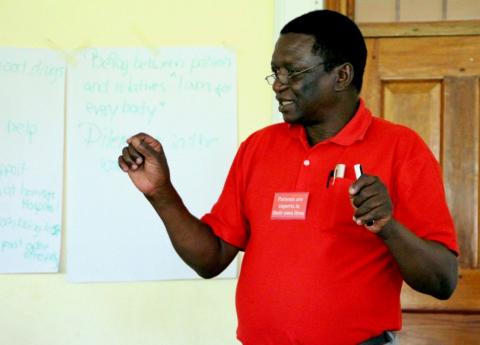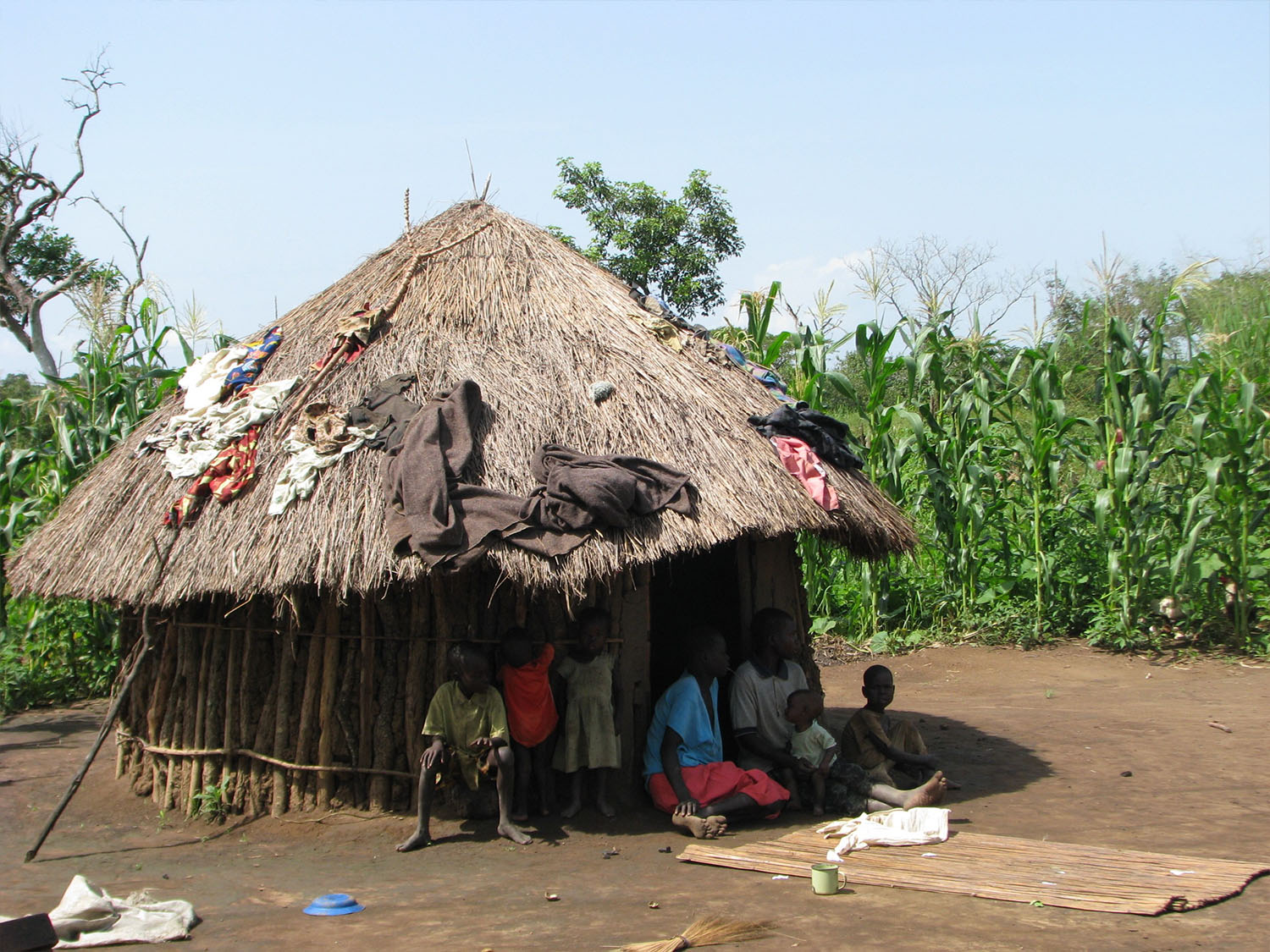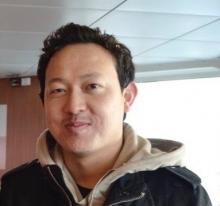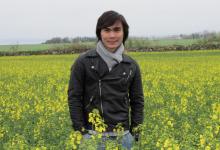Henry Oboke, Uganda. Healing post-war Northern Uganda

Henry Oboke always knew he wanted to do something that helped his country and people. As a child, his dream was to become a scientist.
But in 1972, when he was in secondary school, Uganda’s former president Idi Amin expelled the Indian community from the country. Henry Oboke’s science teacher was an European expatriate. Unsure about his future in Uganda after the Indians were expelled, the science teacher took off leaving the school’s science classes in disarray. Henry Oboke decided to study geography, economics and psychology instead of science; a choice he has not regretted.
I think it all worked out well. I have now served in the medical sector and taught new students psychology for close to three decades. In a way, I think I have helped my people and my country better as a psychologist than I would have as a scientist, Henry Oboke says.
Rebuilding everything from scratch
Listening to his story, it indeed sounds like he has.
Henry Oboke is from Northern Uganda, the area that for more than two decades was ravaged by a brutal civil war between the rebel group Lord's Resistance Army, LRA and the Ugandan Government troops, UPDF.

Today, it is more than 10 years ago that the war ended. But the region is still marked by the war-era. For more than 20 years, 1.6 million people did not have the opportunity to cultivate their land, rear cattle or otherwise earn a living. Instead, they were forced to live in interim camps for internally displaced people, while their sole livelihood; domestic animals were degraded. A whole generation grew up knowing no other life than the camp-life.
The destruction caused by the war was widespread and all encompassing. It broke down everything, socially and economically, Henry Oboke says.
Gulu University opened
To counter some of the damage, a group of the country's leading academics decided that establishing a university in Northern Uganda would be paramount for the reconstruction of the region. Already in 2001, five years before the war officially ended, Gulu University was founded as a vision of community transformation.
In the beginning, the focus of Gulu University was to provide equitable higher education in science and agriculture. Later the scope expanded. In 2010, the Medical Faculty opened. Henry Oboke was transferred from Makerere University in Kampala to become a lecturer at the new university.
Post-war the hardest
Back in Northern Uganda, Henry Oboke soon concluded that although the war had been unbearably hard, the post-war period took an even harder toll on the region’s people. In the camps, they had been forced to rely on others for everything; food, soap, clothes or even money. This dependency had created a general feeling of apathy among people. It proved difficult to get rid of after they had left the camps.

Even a decade after the war ended, it is still hard for people to take responsibility and get on with their lives, Henry Oboke says.
He explains that the apathy manifests itself in reluctance to farm or look for alternative ways of making a living especially by young people. This again causes dysfunctional families marred by constant quarrels about the control of crops and the food they manage to produce and the money they do not earn. Add chronic illnesses, alcoholism and domestic violence to the situation and it becomes a lethal cocktail. By the time Henry Oboke returned to Gulu, the problems had gotten completely out of control in certain areas resulting in exceptionally high suicide rates in communities living in Gulu Dustrict. He saw it as a sign of utter desperation.
50 annual suicides and double the number in suicide attempts in communities of a few thousand people is way too many. To me it is a community-cry for help, he says.
How to prevent suicide in Gulu
When University of Southern Denmark (SDU) in partnership with Gulu University, embarked on the Danida supported Gulu Primary Health Care (PHC) project and called for two PhD projects, Henry Oboke submitted a proposal for a research project titled: Is suicide preventable in Northern Uganda? A rhetorical question directed to examine the standard predicaments; that the poverty, the chronic illnesses (HIV), the high rate of mental illnesses including Post Traumatic Stress Disorder (PTSD) would make it unlikely to prevent suicide and suicide attempts in the post conflict era.
Method based on village life
The project was accepted and Henry Oboke started his empirical work in 2014. He chose to use a very down to earth help-to-self-help approach based on the community spirit of the villages in Northern Uganda.
In a traditional African setting, everyone knows each other and talks to one and other. The village life form a network where everything is everyone’s concern. The good things are noted, copied and multiplied and the bad things are discarded. I decided to mobilize people round this community spirit and use it the backbone of my intervention, Henry Oboke says.

The village helpers provide problem-solving therapy
With the help from the region's community development officers, Henry and his team identified 54 ordinary people in 54 parishes. They were appointed Village Helpers in providing problem-solving therapy. It included training in identifying signs of despair and stress that can possible lead to depression and - in the worst cases - suicide.
The signs are not mysterious in any way. It can be recurrent quarrels in a household or if the husband or wife frequently stays away from home. Children that look unhappy or do not attend school may also be an indication of complications in a family, explains Henry Oboke.
The Village Helpers were also taught how to offer simple problem solving methods to families or individuals in need.
We trained the Village Helpers in how to break down big problems into smaller issues. If the problem in a family turned out to be difficulties with paying school fees, the Village Helpers would speak with the husband or wife about paying the instalments in smaller portions. If the problem was lack of food, the Village Helpers would help people understand that digging a few hours a day is better than doing no farm work at all. If it was sickness, the Village Helpers would refer the family or escort them to a health facility to start off with, Henry Oboke says.
Rarely, someone would need more advanced medical care than the basic problem-solving therapy the Village Helpers could provide. In those cases, the Village Helpers would get hold of Henry Oboke or his team for specialized psychological support or would use a built-in referral system through the higher level health centres for individualised care.
Appreciated and proud
Looking back, Henry Oboke proudly recognized that the results of his project have been overwhelming positive. The suicide rate reduced dramatically in the parishes where the project was rolled out. In addition, there is a general sense of appreciation towards the Village Helpers.
People started to love the Village Helpers because they genuinely assisted those in need. Even the police would tell us that they had fewer incidences of domestic violence and fights, Henry says.
Unforeseen positive side effects of the project were also realized. Henry Oboke raises his voice in excitement when he explains that because the Village Helpers helped changing other people’s lives it also changed their own lives.
The Village Helpers started to feel important and useful. Other people appreciated their work and continue to consult them beyond the project life, he says.
Hope to expand his army of helpers
Henry Oboke is still to submit the final thesis by the end of 2017. It is his wish that it will be a stepping stone for a more far-reaching project to help Northern Uganda heal from its past.
We have now seen what a small army of Village Helpers can do. Just imagine the impact if we could extend it to the entire Northern region, or use the same approach to fight malaria, childhood diseases or any psychosocial difficulties, he says.





